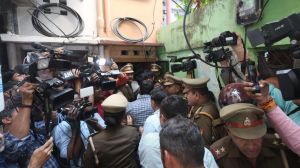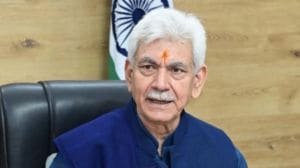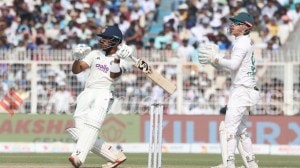Decode Politics | Plans for another no-trust motion against Jagdeep Dhankhar: Why it is a new low in House ties
In August this year, Opposition had planned the no-trust motion against Dhankhar but could not go ahead as the Session ended; in 2020, MPs submitted a no-confidence resolution against then Rajya Sabha Deputy Chairman Harivansh
 Rajya Sabha Chairman Jagdeep Dhankhar conducts proceedings in the House during the Winter session of Parliament. (PTI)
Rajya Sabha Chairman Jagdeep Dhankhar conducts proceedings in the House during the Winter session of Parliament. (PTI) The Opposition is set to move a no-trust motion against Rajya Sabha chairperson Jagdeep Dhankhar in the ongoing Winter Session, sources told The Indian Express. The Trinamool Congress and Samajwadi Party (SP) MPs have already signed the notice for the same under Article 67(b).
This is the second such attempt this year.
In August, the Budget Session of Parliament had ended on a tense note in the Rajya Sabha, with the Opposition considering submitting a notice for a no-confidence or impeachment resolution against Vice-President and House Chairman Jagdeep Dhankhar.
This was after days of sparring between Dhankhar and Opposition MPs in the House. A day before the Session ended, the Chairman left the House in a huff amid the Opposition’s protests seeking government response over the disqualification of wrestler Vinesh Phogat at the Paris Olympics.
At the time, Opposition leaders claimed that more than 80 MPs had already signed the notice that was to be moved against Dhankhar. However, with the Session ending, the Opposition did not move ahead with the notice.
* What do the rules say?
Article 67 of the Constitution says that the Vice-President may be removed from office with a resolution passed by a majority of members in the Rajya Sabha. The House of the People or the Lok Sabha has to agree to the resolution as well.
The resolution, however, should be moved with at least 14 days’ notice.
* Have there been previous attempts to remove the Rajya Sabha Chairman?
While there is no precedence of a no-confidence or impeachment resolution being moved against the Rajya Sabha Chairman, the Opposition had in 2020 submitted a no-confidence resolution against Rajya Sabha Deputy Chairman Harivansh.
The move followed an uproar in the House over his decision to extend the Session beyond the scheduled 1 pm, overruling Opposition pleas to continue discussions on the contentious farm Bills the next day.
As per Article 90 of the Constitution, which deals with “Vacation and resignation of, and removal from, the office of Deputy Chairman”, a member holding office as Deputy Chairman of the Rajya Sabha may be removed from his office by a resolution of the Rajya Sabha passed by a majority of all the then members of the Rajya Sabha. The resolution can be moved only when at least fourteen days’ notice has been given of the intention of moving”.
The Opposition resolution at the time stated: “The Deputy Chairman has violated all the canons of law, procedure, parliamentary procedures, practices and fair play. Today, the Deputy Chairman did not allow points of order to be raised, did not allow large numbers of members of Rajya Sabha from diverse political parties opposing the anti-farmer Bill…even to speak.”
It said that the Opposition parties have “no confidence” in the Deputy Chairman, “hereby move this motion for his removal”, and that he cannot “preside over the House” till a decision on their motion is taken.
Among the parties that backed the resolution, which was drafted by lawyer-MPs Abhishek Singhvi and K T S Tulsi, were the Congress, TMC, DMK, CPM, CPI, RJD, AAP, TRS, SP, IUML and Kerala Congress (M).
The Opposition move was described as “unprecedented” by Parliament veterans. “As far as I can remember, there has been no instance of a no-confidence motion against the Deputy Chairman of the Rajya Sabha,” P D T Achary, former Secretary General of the Lok Sabha, had told The Indian Express.
* So, no motion has ever been moved against the Chair of a House?
Moving the motion against Harivansh in 2020, the Opposition had said: “Appropriate precedents in this regard are available in several treatises, including the ‘Practice and Procedure of Parliament by M N Kaul and S L Shakdher’ seventh edition… and Article 90 of the Constitution.”
The precedents cited from the book by the Opposition included resolutions moved against the first Lok Sabha Speaker, G V Mavalankar, in 1951, Speaker Sardar Hukam Singh in 1966, and Speaker Balram Jakhar in 1987.
The resolution against Mavalankar came up for discussion and was negated by the House. The other two resolutions were also discussed and negated by the House.





- 01
- 02
- 03
- 04
- 05


























